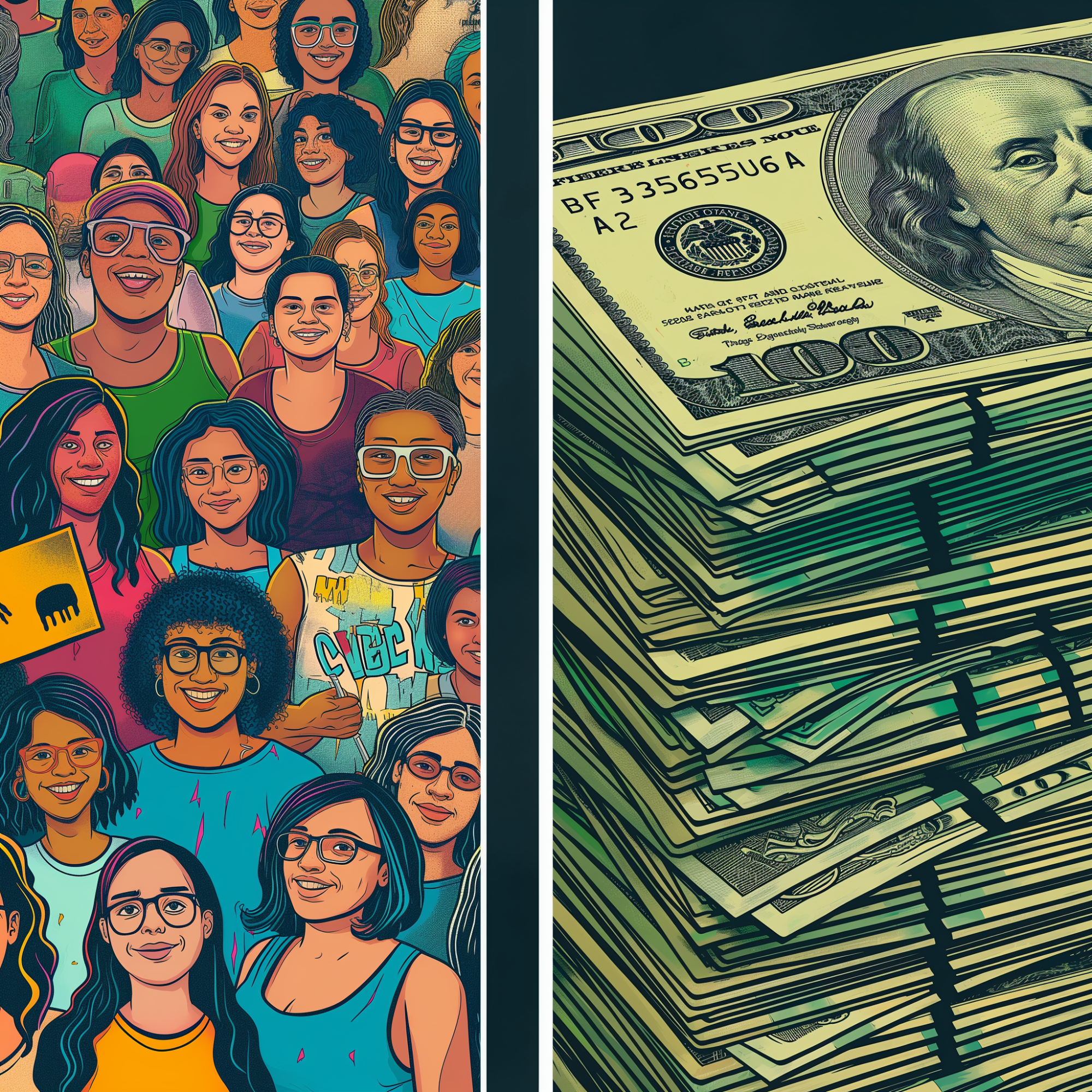Blog
Is the United States a true democracy, or does it veer towards plutocracy? This question isn't just academic or theoretical; it's a critical examination of the very fabric of American politics. While democracy promises governance by the people, for the people, and of the people, the reality of American government might be more complex and nuanced.
Both democracy and plutocracy have their roots in the ancient world. Today, democracy manifests primarily through representative forms of government where citizens elect their leaders, aiming for a society where power is decentralized and diverse voices can be heard. Yet the ideal of democracy is continually challenged by the influence of wealth and money in politics, suggesting shades of plutocracy, where the wealthy hold disproportionate sway.
In this guide, we’ll unpack the definitions of democracy and plutocracy. Then, we’ll explore the correlation between wealth and government influence in the United States.
Democracies vs. Plutocracies: An Overview
Before analyzing the nuances of the American political system, it’s crucial to understand the definitions of democracy and plutocracy.
Attributes of Democratic Political Systems
At the heart of democratic ideals lies the participation of the people in government. Historic democratic governments such as ancient Greece practiced a direct form of citizen participation. This system is called direct democracy, and differs from our contemporary system of representative democracy.
Large populations make direct democracy impractical in modern times. As a result, citizens exercise power primarily by electing representatives, governors, presidents, and other officials. Whether direct or indirect, democratic ideals have many desirable attributes and produce many benefits, such as:
Decentralization of Power: Democracies like the United States have different branches of government exercising judicial, legislative, and executive or administrative powers. These branches have powers and mechanisms to prevent governmental overreach and abuse of power by any particular official or set of officials.
Expression of Diverse Views: Democratic principles take into account the different perspectives, values, and experiences of diverse citizens.
Civic Participation: Democratic ideals promote civic engagement, thanks to the ability of citizens to attend government meetings, vote, volunteer in campaigns or movements that advance their concerns and interests, and express their ideas.
Social and Public Services: Spending on healthcare, education, and other social services highlights another difference in democracy vs. autocracy. On the whole, countries practicing the former form of government spend greater amounts on these areas than countries ruled by dictators, single parties, or small groups such as oligarchs.
Accountability: Citizens can hold public officials and public employees accountable for the quality of education, public transportation, national and local security, and public safety.
In addition to its long list of benefits, democratic systems also face certain challenges. Representative democracies can struggle with inefficiency, as rigorous systems of checks and balances can make it difficult to pass legislation quickly. Political polarization and gridlock can also slow down the law-making process.
Note that democracy does not always equate to a capitalist economic structure. Democratic socialist countries such as Germany, Australia, and Bolivia use alternative economic structures as a path to eliminating economic inequality and bettering wealth distribution.
Attributes of Plutocracies
Plutocracy is a form of governance where power is primarily held by the wealthy, or where wealth is the principal basis of influence and authority in political decisions. In a plutocracy, the rich and powerful have a significant impact on the formulation of policies, laws, and the overall direction of the nation. This control can either be exerted directly (by individuals occupying positions of power due to their wealth) or indirectly (through significant financial contributions to political campaigns, lobbying, and other means of influencing political outcomes).
The main difference between democracy and plutocracy hinges on the scope of political representation. Plutocracy can be seen as a form of oligarchy — rule by a small group, rather than by the majority of the people.
Other types of oligarchy include:
Aristocracy, which grants political power based upon a social hierarchy or upon possessing high character and intellect
Theocracy, in which the ruling class consists of clergy, priests, clerics, or other religious leaders
Stratocracy, which is government by military leaders
Unlike in democratic governance, the range of interests represented in plutocracies and other oligarchies tends to be narrow. For plutocrats, government exists primarily to maintain and promote the concentration and maintenance of wealth.
Plutocracies face the following concerns and criticisms:
Tendency for corruption
Lack of concern for the overall social welfare of the people, including the alleviation of poverty, homelessness, and sickness
Pollution and harm to air, water, and the environment
Limited ability of those in lower economic levels to advance
Wealth disparity and economic inequality
Suppression of civic participation and civic engagement
In a plutocracy, political actors are often concerned primarily, if not exclusively, with wealth and, thus, resist passing laws that might endanger their business interests. In this system, government policy can easily become out of step with public sentiment and popular opinion.
Is the United States a Democracy or Plutocracy?
Plutocratic forms of government do not necessarily require legal or even intentional creation. Plutocratic tendencies may arise when wealthy individuals, corporations, or advocacy groups persuade elected officials to do their bidding.
The influence of wealth on the American political system often comes through donations to political campaigns or causes. In our current system, money plays a disproportionate role in elections. How much of a disproportionate role?
Consider the following points and statistics:
Elections require increasingly immense amounts of fundraising. For example, according to the Federal Elections Commission, campaign disbursements from 796 House of Representatives candidates from January 2023 to June 2023 totaled over $202 million. The amount of money needed to successfully campaign for office is steadily increasing over time.
Large donors contribute the majority of campaign contributions. During the 2020 presidential race, for instance, the winning candidate, Joe Biden, received only 38.94% of campaign contributions from small donors. Biden’s main competitor, Donald Trump, received only 48.85% of campaign contributions from small donors.
Mega-donors play a disproportionate role in elections. Since the landmark decision Citizens United v. Federal Election Commission in 2010, the proportion of total campaign contributions donated by the top 1% of individual donors has increased. Prior to the ruling, the top 1% contributed an average of 7.4% of campaign donations. From 2010 to 2018, the top 1% have contributed an average of 20.1% of campaign donations. Perhaps even more concerningly, the influence of the top 0.1% of donors has risen during that same time frame from 2.3% to 12.7%.
Corporations benefit from increasing their donations to political campaigns. The Center for American Progress refers to a study finding that every dollar a corporation gave to a political campaign corresponded to $6.65 in corporate tax savings.
Consider, as well, the role of dark money in American politics — the money channeled through Super PACs, 501(c)(4) organizations, LLCs, and other groups to fund political campaigns without disclosing the source of the contributions.
Altogether, the American political system has become corrupted by the outsized influence of money. With wealthy individuals, corporations, and powerful anonymous donors holding immense sway over elections, it has become typical for elected leaders to feel more indebted to those who financed their campaigns rather than to those who voted them into office.
Does this make the United States a plutocracy? The question remains up for debate, but it is difficult to argue against the claim that wealth and money have infected American democracy. The United States has often been seen as a beacon of democracy, yet a closer look at the current system can reveal alarming similarities to a more plutocratic form of governance.
The Movement for Democracy Reform
The democracy reform movement is working to restore American democracy to a system that represents the people, not just wealthy or corporate interests. There are a number of ways that different organizations and individuals are working to make a change, from reforming the United States’ electoral systems to reducing the influence of the two establishment parties on democracy.
You can get involved in the democracy reform movement in a variety of ways. Two of the best are to consider volunteering in support of people-powered, anti-corruption candidates for elected office, or to consider running for office yourself.
Want to learn more about how you can make a difference? Book an info meeting with our team to talk about how you can get involved as a volunteer, or book a free consultation about launching your campaign for office. We’ll get you connected with the resources you need to bring positive change to American democracy.

